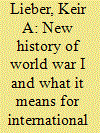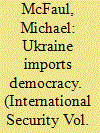|
|
|
Sort Order |
|
|
|
Items / Page
|
|
|
|
|
|
|
| Srl | Item |
| 1 |
ID:
080680


|
|
|
|
|
| Publication |
2007.
|
| Summary/Abstract |
An effective terrorism alert system in a federal government has one central task: to motivate actors to take costly protective measures. The United States' color-coded Homeland Security Advisory System (HSAS) failed in this mission. In federal systems, national leaders cannot compel protective actions by setting an alert level; they must convince constituent governments and private parties that the desired actions are worth the costs. Such beliefs can be generated either by sharing the information behind an alert or by developing enough confidence in the alert system that the government's word alone suffices. The HSAS did neither, largely because it was not designed to generate confidence. Rather, the system's creators assumed that the public would trust the national leadership and believe in the utility of the system's information. Over time, as the HSAS became increasingly perceived as politically manipulated, there was no built-in mechanism to recover confidence in the system. An alternative, trust-based terrorist alert system could solve this problem. Building on the notion of "procedural fairness" from the psychological and legal traditions, this system would retain the political advantages of the HSAS, facilitate greater compliance among the requisite actors, and ameliorate many of the strategic problems inherent in terror alert systems.
|
|
|
|
|
|
|
|
|
|
|
|
|
|
|
|
| 2 |
ID:
080677


|
|
|
|
|
| Publication |
2007.
|
| Summary/Abstract |
According to mainstream opinion, the George W. Bush administration's assertive unilateralism represents a temporary departure from the traditional foreign policy of the United States, one that will be rectified by a change of personnel in the White House in 2009. This interpretation of recent trends in U.S. policy is illusory. The Bush administration's foreign policy, far from representing an aberration, marks the end of an era; it is a symptom, as much as a cause, of the unraveling of the liberal internationalist compact that guided the United States for more than half a century. The geopolitical and domestic conditions that gave rise to liberal internationalism have disappeared, eroding its bipartisan political foundations. In today's partisan landscape, the challenge is devising a grand strategy that not only meets the country's geopolitical needs but also is politically sustainable. A strategy that is as judicious and selective as it is purposeful offers the best hope for moving the United States toward a more stable and solvent political equilibrium
|
|
|
|
|
|
|
|
|
|
|
|
|
|
|
|
| 3 |
ID:
080679


|
|
|
|
|
| Publication |
2008.
|
| Summary/Abstract |
The prospects for a two-state solution to the Israeli-Palestinian conflict remain poor, largely because of Israeli rigidity as well as Palestinian policies and internal conflicts. The United States has failed to use its considerable influence with Israel to seek the necessary changes in Israeli policies, instead providing the country with almost unconditional support. The consequences have been disastrous for the Palestinians, for Israeli security and society, and for critical U.S. national interests in the Middle East. Amajor explanation for the failure of U.S. policies is the largely uninformed and uncritical mainstream and even elite media coverage of the Israeli-Palestinian conflict in the United States. In contrast, the debate in Israel is more self-critical, vigorous, and far-ranging, creating at least the possibility of change, even as U.S. policy stagnates. Acomparison of the coverage of the Israeli-Palestinian conflict by the two most prestigious daily newspapers in the United States and Israel-in particular, over the breakdown of the peace process in 2000 and the ensuing Palestinian intifada, the nature of the Israeli occupation, the problem of violence and terrorism, and the prospects for peace today-underscores these differences. While the New York Times has muted the alarm over the dangers of the United States' near-unconditional support for Israeli policies toward the Palestinians, Haaretz has sought to sound the alarm.
|
|
|
|
|
|
|
|
|
|
|
|
|
|
|
|
| 4 |
ID:
080681


|
|
|
|
|
| Publication |
2007.
|
| Summary/Abstract |
World War I looms large in international relations theory. The core concepts of defensive realism-the security dilemma, spiral model, and offense-defense balance-were largely inspired by this single historical case, and evidence from the war is frequently used to test explanations built on those concepts. The new historiography of World War I, however, challenges many of the long-held assumptions about the origins of the conflict. Newly available evidence strongly suggests that German leaders went to war in 1914 with eyes wide open. They provoked a war to achieve their goal of dominating the European continent, and did so aware that the coming conflict would almost certainly be long and bloody. Germany's leaders did not go to war with a bold operational blueprint for quick victory embodied in the Schlieffen Plan; they did not misjudge the nature of modern war; and they did not lose control of events on the eve of the conflict and attack out of fear that Germany's enemies would move first. In light of the new history, international relations scholars should reexamine their empirical understandings of this conflict, as well as their theoretical presuppositions about the causes of war.
|
|
|
|
|
|
|
|
|
|
|
|
|
|
|
|
| 5 |
ID:
080678


|
|
|
|
|
| Publication |
2007.
|
| Summary/Abstract |
Can the West promote democracy? An examination of one critical case, the 2004 Orange Revolution in Ukraine, offers a unique method for generating answers to this important theoretical and policy question. Tracing the causal impact of external influences first requires a theory of democratization composed exclusively of domestic factors, specifically the changing distribution of power between the autocratic regime and democratic challengers. Once these internal factors have been identified, the extent to which external factors influenced either the strength of the autocratic regime or the democratic challengers can be measured. Domestic factors accounted for most of the drama of the Orange Revolution, but external factors did play a direct, causal role in constraining some dimensions of autocratic power and enhancing some dimensions of the opposition's power. International assistance in the form of ideas and financial resources was crucial to only one dimension of the Orange Revolution: exposing fraud. Yet significant international inputs also can be identified regarding the preservation of semi-autocracy, the nurturing of an effective political opposition, the development of independent media, and the capacity to mobilize protesters after the falsified presidential vote.
|
|
|
|
|
|
|
|
|
|
|
|
|
|
|
|
|
|
|
|
|